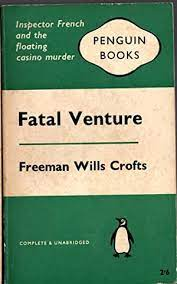If I'd read Fatal Venture as a teenager, I wouldn't have been impressed. I tried Freeman Wills Crofts at the age of thirteen or fourteen and found the books a struggle. I gave up at least one of them long before the end. There simply wasn't enough pace and excitement for me. And this novel certainly moves at a stately pace. Yet, a lot older and a bit wiser these days, I appreciated its merits when I read it a while back.
The story was published in 1939, but you'd never guess that war was looming. There is brief mention of a foreign envoy, but no hint of international tensions. On the contrary, the government's chief preoccupation seems to be its moral panic over a floating casino which offers cruises around the British Isles, just outside the three mile limit. A good deal of space is devoted to the plans to set up the casino business, and this is relevant to the plot, but people less interested in business life than me might find reading this part of the story a bit of a chore. Murder isn't done until we're almost half-way through the book.
In reading this novel, I was interested to try to figure out how Crofts wrote it. The central plot twist involves a pretty simple idea that he might easily have used in a short story. As you might guess, it concerns an alibi. It's clear that he took a dim view of gambling and this issue adds texture to the story, though he never gets under the skin of the gambler's obsession or indeed of the terrible consequences of gambling addiction. Crofts loved to travel, and the extensive travelogue aspects of the story, although again relevant, aren't conducive to pace. But I must admit that they reminded me that I'd like to go on a cruise of the British Isles - I gather that they have become increasingly popular, post-pandemic, though gambling isn't a component of the offer to tourists.
Crofts added depth and interest to the story with a structural device that enabled him to weld his components into a single entity and make a full-length novel out of them. The book is composed of two parts: pre- and post- police investigation. We see the establishment of the floating casino business through the eyes of Morrison, a young man who becomes closely involved. Morrison is quite likeable, but his occasional stupidity, although necessary to make the story work, is slightly irritating. Then - even though the crime is not committed in England - Inspector French comes on to the scene, and we know that eventually he'll get his man - or woman. There's even a bit of 'had-I-but-known' stuff to encourage readers to keep going: 'Though neither of them knew it, their tentative arrangement was to prove the most momentous either had ever made', for example. I think some readers will find this a minor work, and rather slow-moving, but I enjoyed it.

No comments:
Post a Comment